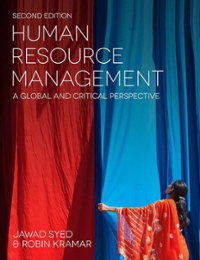Ewere woke up at 5:15 a.m. and quickly got ready as she wanted to avoid the hectic
Question:
Ewere woke up at 5:15 a.m. and quickly got ready as she wanted to avoid the hectic Lagos traffic jam. At this time, it would only take her 20 minutes to reach the office, but if she set off any later, it could take more than two hours to cover the short distance. She was already dreading another long day; the return journey would be quicker if she stayed at work till about 7 p.m. Her husband, Osagie, was also up and getting ready for work but their two daughters were still peacefully asleep. She was very thankful to her parents, especially her mother, for all their help and support with the girls. She couldn't help feeling guilty, however, for missing out on her children's daily activities. Comments from both her parents that she never has the time to fulfil her home responsibilities didn't help the tension she constantly felt when at work.
When she arrived in the office, her boss, Mr Adebayo, was standing by her desk with a large pile of staff appraisals. She needed to review and countersign them by lunchtime, he mentioned on his way out. After the consolidation of Nigerian banks a few years before, competition had increased in the industry, and senior managers in her bank kept reminding staff 'how lucky' they were to have a job. Ewere felt that everyone was out for themselves and wanted to showcase their own individual achievements.
Staff always seemed so busy and focused on their work. She could tell, however, that they were not necessarily productive, although they were very keen to be 'seen to be working'. It was clear that her boss expected everyone, men and women, to be committed to the organisation, and he would often be overheard saying 'we need to put the company first'. Flexibility or flexible policies were never discussed as an option at the bank. When you were hired, it was assumed you would work full time - although it often felt like she working two days in one, from 6:30 a.m. to 7:30 p.m. There was never any acknowledgment or explicit appreciation of her hard work and the long hours she put in.
Ewere was almost half way through the appraisal forms. It was 10:30 am and she was already exhausted. She had four meetings scheduled in the afternoon and still had to prepare for two of them, but her mind was elsewhere. Her mum had told her the previous night that she and her father were 'too old to be full-time parents for the second time'. She had ambitions to progress further, but she also felt she was missing out on so much at home.
Ewere left work at 7:15 p.m. that evening and made it home at 8:00 p.m. The girls were already asleep. She could hardly hold a conversation with her husband and parents over dinner. She could feel her mum's disapproving stare on her but tried to ignore it. She and Osagie got up, said goodnight to her parents, and went to bed exhausted, knowing that the next day would be very similar to the one she had today.
Questions
1 What are the key issues Ewere is facing at work and at home?
2 Is she receiving support from her organisation? Is she receiving support from her family?
3 What areas could be improved at work to help her better balance her work and personal life demands?
Step by Step Answer:

Human Resource Management A Global And Critical Perspective
ISBN: 9781137521620
2nd Edition
Authors: Jawad Syed, J; Kramar Syed, Robin Kramar





